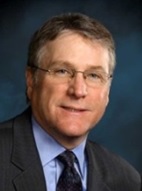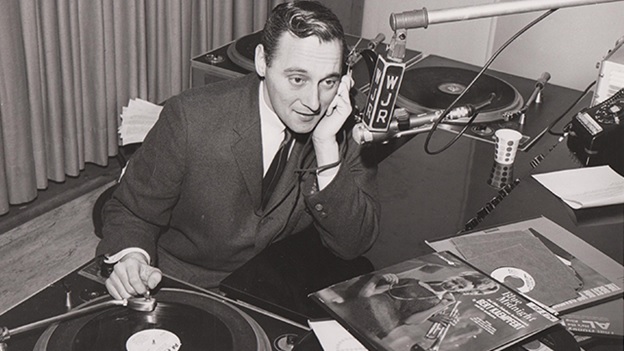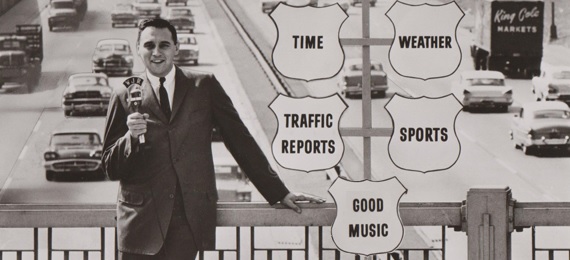If you know anything about Detroit radio, you know the market has always been famous for its legendary radio personalities. Steve Dahl, Dick Purtan, Arthur Penhallow, Howard Stern, Byron MacGregor, Lee Alan – they all earned their chops on the Motor City airwaves.
And some stayed in Detroit, and made radio their careers. In McCarthy’s case, he left Motown for San Francisco, but came back for good – smarter and wiser. Of all the truly iconic radio personalities in Detroit, none shined brighter than WJR’s charming, connected, and brilliant J.P. McCarthy. He was the voice of Detroit, and was the guiding star for a radio station that called itself “The Great Voice of the Great Lakes.”
At one time, J.P. did the morning show as well as the “Afternoon Music Hall” (from 3:15-6 pm). Eventually, his duties were limited to his morning show, and an interview show he hosted each day at noon called Focus where he interviewed interesting people from all walks of life. When you heard the phrase, “From the golden tower of the Fisher Building,” you thought about the morning man who so many depended on.
J.P. was especially famous for his contacts. He could pick up the phone and call the President of General Motors, the Governor of Michigan, or the owner of the DetroitTigers. Or he would call the famous Mission at San Juan Capistrano when the famous swallows returned each year. It was J.P.’s “Ground Hog Day.”
Many Baby Boomers like me first heard J.P. while in the car with dad. In the early years, I was a reluctant listener, but over time, I came to appreciate just how amazingMcCarthy truly was, and what he meant to his always top-rated audience and the crazy city in which he held court every weekeday morning.
 And then all of a sudden in early 1995, it came to a halt. McCarthy contracted myelodysplastic syndrome, and his presence on the radio greatly diminished. He was gonelater that year. J.P. was only 62.
And then all of a sudden in early 1995, it came to a halt. McCarthy contracted myelodysplastic syndrome, and his presence on the radio greatly diminished. He was gonelater that year. J.P. was only 62.
Earlier this month, Detroit Public Television produced a J.P. McCarthy documentary, The Voice of Detroit. Working with J.P.’s friends, families, and co-workers, the show tells the story of perhaps the most influential media star to grace the airwaves in Detroit.
Rich Homberg, President and CEO of Detroit Public Television, wrote today’s “Guest List.” Rich ran WWJ/CBS Radio, and launched Detroit’s highly rated sports station, WXYT/The Ticket. He has a great perspective on the radio business with a career that spans 35 years with Westinghouse, CBS, and Viacom.
Rich took a look at J.P.’s career through the filter of providing a basic playbook for what it took to become the biggest radio force in the market. These same attributes apply today in a digitl world that McCarthy could never have imagined.
Here are “The 5 Things Every Radio Personality Can Learn From J.P. McCarthy.”
1. Magic
Put a hundred people on the radio, maybe one or two will shine. Who’s kidding who – the great personalities have a magic that is truly a unique gift.
The ability to be both “larger-than-life” and “the guy I drive to work with” is a hard combination to find. To win, you need to be both human and amazingly human.
J.P. had the magical gift of a great personality. That is certain. He could move from an interview with the CEO of Chrysler to a call from a woman who wanted to offer her husband a birthday wish.
How many TV guys tried radio and failed? Almost all of them. When sports radio started, just about every sports writer in town tried to become a personality. Only Wojo has the right chemistry, here in Detroit.
If you don’t have the magic, it is simple: head for sales and become a GM. (Don’t most GMs really wish they were doing mornings?)

2. The Team
J.P. had a whole crew of producers and players (like Executive Producer, Hal Youngblood). They all made the show work. And he showcased them. In fact, he made his producers famous.
When you talk to Paul W. Smith (J.P.’s replacement who continues on WJR to this day) you always hear about Anne Thomas, his great producer. Dick Purtan had a whole crew of great people, so does Mitch Albom. Jim Harper had an incredible team. In each case, they recognized the value that each player brings.
3. Work 24/7 to build your brand
J.P. was “the Frank Sinatra of Detroit.” And though it seemed effortless, it was actually a 24/7 job. He built a position for himself that was as strong a brand as Cadillac’s.
At the same time, J.P. was disciplined in the way he handled himself, always protecting his brand image. Nobody knew who J.P. voted for, because that wouldn’t fit his brand. In a town that is as challenged as any on issues of diversity, J.P. moved through every community because people trusted him.
Somewhere in their portfolio, most great talent finds a way to give something back via a radiothon or personal commitment. That is just another part of building the long-term position.
4. See the station as a business partner and not as an employer
J.P., Dick Purtan, Paul Harvey, and Howard Stern were all great employees and great partners to the stations/networks they worked for.
Big talent makes big money. And at the same time, on a day-to-day basis, they are part of a station’s staff. The great ones know enough to be part of a team off-the-air, too. Successfully building client connections, community relationships and working with every department in a station is part of the assignment.
Mel Karmazin built an entire company around personality-partners. Here in Detroit, he hired Dick Purtan and built a powerhouse at WOMC. Dick’s attorney, Henry Baskin, was able to offer Mel a station-in-a-box talent because Purtan was a model businessman.
Jackassing around the station is just a waste of time. And it reduces your partner’s (station ownership) commitment to you. You still see too many personalities who see the owners as the enemy. That just doesn’t work. If you talked to the folks who built Cap Cities (WJR’s parent company back in the day), I’m sure they would tell you that J.P. was both a model employee and a business partner.

5. Luck
Luck, timing and opportunities will come your way. You need to make the most of them.
When WJR called J.P. about coming back from San Francisco, asking him to come back, an opportunity was created that changed his life and brought Detroit an incredible voice and soul.
J.P. had it all.
Thanks to Rich Homberg for writing today’s “Guest List” and to Detroit Public Television for producing this great radio documentary. You can watch it here.
More Guest Lists
- Gene & Julie: 5 Morning Radio Bits That Always Work
- Roger Lanctot: 5 Things Radio Broadcasters Should Know About The Auto Industry
- Alan Mason: 5 Things About Christian Radio That Would Surprise Commercial Broadcasters
- James Cridland: 5 Countries You Should Look At For Radio Ideas
- Elsie Escobar: 5 Things Radio Broadcasters Should Know About Podcasting
- How AI Can Give Radio Personalities More…PERSONALITY - April 23, 2025
- Can Radio Afford To Miss The Short Videos Boat? - April 22, 2025
- Media And Technology In 2025: Believe It Or Not! - April 18, 2025





Never met JP but while doing the mornings on WWDC here in Washington, gave him a call one morning to talk about the upcoming game between the Senators and Tigers. He could not have been more gracious. What a fabulous career! The way he handled things is sadly missing from todays voices.
He was the consummate pro, Johnny. Thanks for sharing that J.P. McCarthy memory.
I grew up in Toledo and lived there from 1936 to 1981 and listened to J P every day even after I moved to Cincinnati and have never since enjoyed anyone on radio who could match his style. Today it all about shock value and ratings. It was very sad when he passed on. There will never be one like him.
He truly was the best. And he shined in an era when radio ruled. No one was more in touch with the rhythm of Detroit than J.P. McCarthy. Thanks for the comment.
Jp was the best and I still miss him…fat Bob and all the characters that called him started my day….Assad day, as I stood in my kitchen, the day WJR announced that JP had passed away, irreplaceable!!
Thanks for your memories of J.P., Judy. He is still missed today.